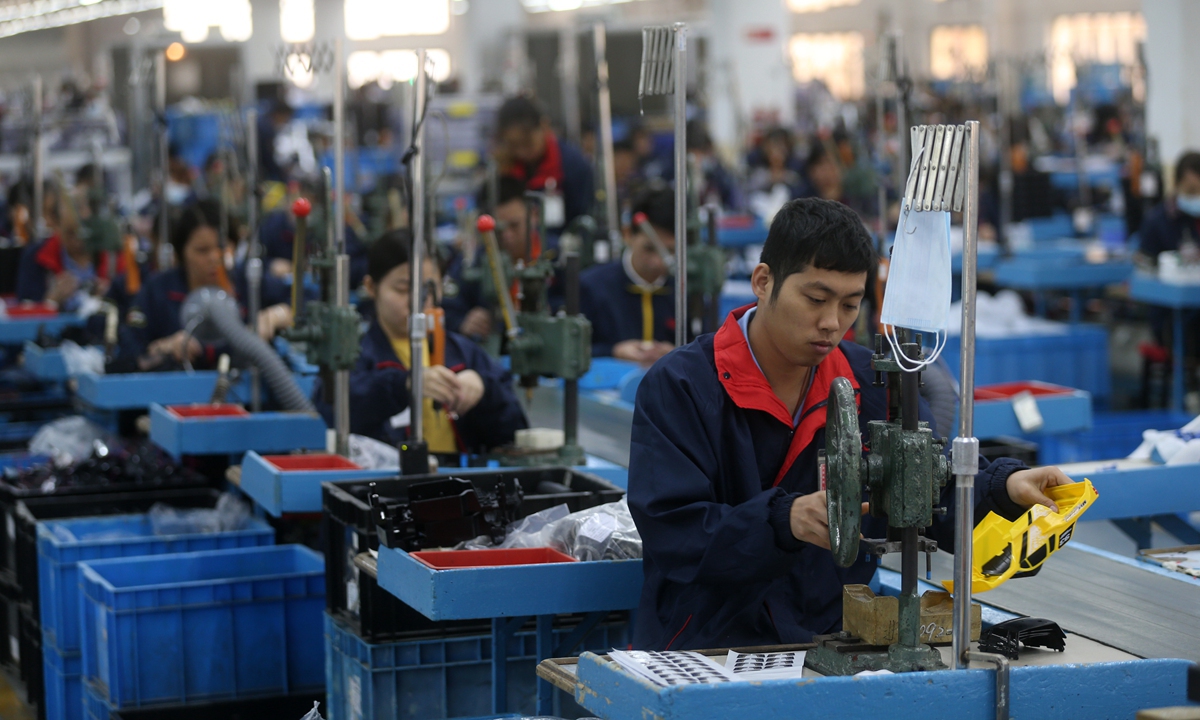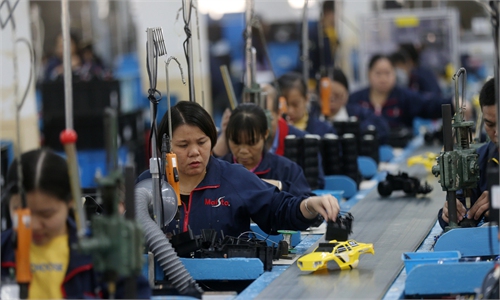Chinese firms, experts say there is ‘no power crisis’ in the country
Supply crunch affected certain areas, but no widespread shortage: experts

Employees of Masito work on production line in the company? workshop in Dongguan, South China's Guangdong Province on December 16. Photos: Cui Meng/GT
Some enterprises in South China's Guangdong Province were told to avoid using electricity during the peak period in May and June, but the shortfall was met by power supply from other regions and production remained normal, enterprises and industry observers told the Global Times on Monday.
In response to recent foreign media reports that have been hyping about a power shortage, the enterprises and industry observers stressed that China has sufficient power supply and there was no widespread power shortage as some media outlets claimed.
Some foreign media reports said that more than a dozen provinces in China have been hit by power shortages in recent weeks, including Guangdong, which accounts for 10 percent of the country's economic output. The reports claimed that the shortage was caused mainly by restrictions on coal power and a drought that reduced hydropower capacity, while electricity demand continued to rise across the country.
A manager at a medical equipment enterprise in Guangzhou, Guangdong, told the Global Times on Monday that the company had received notice of electricity restrictions at the end of May and had to reschedule production for two days but the temporary shift didn't have any impact on production.
A suitcase manufacturer based in Guangzhou also said that avoiding power usage during peak hours, which are 10am to noon and 4 to 6 pm, had no impact on the company's production.
An employee surnamed Yao at an electricity company in Guangdong told the Global Times on Monday that the electricity usage in some places in Guangdong is intense, but conditions are easier than in May and June.
Yao suggested that the lack of rainfall in Southwest China's Yunnan Province in May and June led to the low volume of hydropower.
Yunnan has been confirmed to have entered the rainy season in early July, which could mean sufficient hydropower will come.
Zhang Yan, director of the power sales department of JZ Energy Co, told the Global Times that electricity generated by renewable sources accounted for nearly half of the total power used in Guangdong Province, with hydropower accounting for 33 percent, nuclear power 10 percent, and solar and wind power 5 percent.
According to cctv.com, one-third of the electricity consumed in Guangdong came from hydropower in 2019. A total of 200 billion kilowatt hours (kWH) of electricity was transferred to Guangdong through China's west-east power transmission program annually on average in the past two decades.
From January to May this year, Guangdong consumed 290.3 billion kWh of electricity, up 27.0 percent year-on-year, according to the statistics bureau of Guangdong, which means that hydropower transferred from west China can support power consumption in Guangdong for at least one quarter.
There was no so-called power crisis in China and the shortage of power supply only affected certain regions, Lin Boqiang, director of the China Center for Energy Economics Research at Xiamen University, told the Global Times on Monday.
"The partial power restrictions were largely due to the economic rebound, seasonal peak power consumption in the summer and the impact of climate change. It occurs every year and can happen in every country," Lin said, noting that China has a surplus in power capacity.
Meanwhile, China is adjusting its electricity supply model from traditional coal-generated electricity to renewable energy-generated power, such as offshore wind power, nuclear power and hydropower, Sheng Honglei, business director of TÜV Nord Group China, told the Global Times on Monday.
For example, the Daya Bay Nuclear Power Plant in Guangdong, which started operation in 1994, can generate about 15 billion kWh annually.
"Meanwhile, Guangdong is developing and deploying massive offshore wind power plants," said Sheng.
Some analysts believe that the fundamental reason for the West to smear China's power supply is that China has set a number of international standards in the industry, which the West does not want to see.
Moreover, China's large-scale west-east power transmission program and the ability to distribute power across the country is not available in the West, and is therefore incomprehensible among some Westerners.



